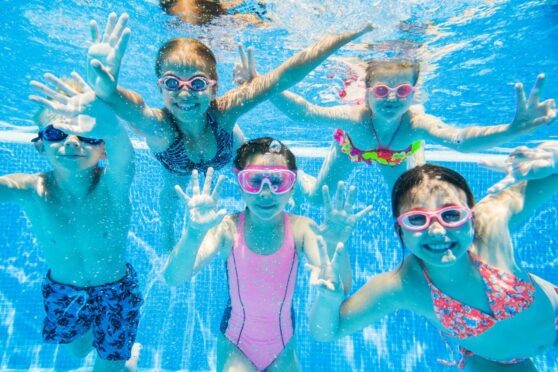
Experts have warned children could miss out on life-saving swimming lessons as pools across Scotland face the pressure of rising energy bills.
The cost to run swimming facilities has tripled in the past two years, according to figures from industry group Community Leisure Scotland, and with the government’s energy relief scheme due to end in April, gyms, clubs and pools fear having to reduce opening hours or close altogether.
According to Scottish Swimming figures, four in 10 children leave primary school unable to swim, and the country already has the highest rate of accidental drowning in the UK.
“Our members are saying that half of community pools will face service reduction or possibly closure within six months,” said Robin Strang, chair of Community Leisure Scotland. “We could see reduced opening hours, higher prices, lowering of pool water temperatures and, in the most extreme cases, closures would be required.”
Sported, the country’s largest community sport charity with almost 250 members in Scotland, says swimming has been “hit by a double whammy” as recovering from closures during the pandemic has now been stalled by the rising cost of living. In the past three years, 65 pools in the UK closed either temporarily or permanently, including eight within Scotland, and it was announced just last week that Perth Leisure Pool is under threat of closure this year, citing soaring energy costs as a major factor.
The average 25m community pool used to cost £100,000 a year to heat, but that has now risen to £300,000. On average, each local authority area has seven pools, resulting in an extra £1.4m per year for local councils or leisure trusts to pay to heat them on top of other budget pressures.
Across the Sported network, 53% of members have witnessed a drop in income, while 37% have experiencing a reduction in young people attending sessions, even when activities are free, as wider economic pressures prevent people from attending.
Mark Woods, strategic communications lead at Sported, said: “We have already seen too many young people lose out on the vital skill of learning to swim during Covid, and that drop in capacity is reducing provision even further. With cost of living pressures, more families simply can’t afford the costs of taking part in swimming or other sports, and that adds up to thousands of kids who are in danger of losing out on the benefits of physical and mental wellbeing it brings.”
Fiona Donald, head coach for Swim-IT in West Lothian, says the swimming club is having to pay more to hire facilities for lessons and practices, and is worried about the impact on children.
She said: “As a club we try to make our lessons as accessible as possible for everybody, so we work with foster parents, low-income households, and people with disabilities. In order for us to be sustainable and provide accessible, affordable lessons for everybody, we may have to look at increasing our fees, which is not something we wish to do. A lot of funding opportunities are actually getting caught, too, so even access funding is really difficult. It is a major concern.”
Unlike in England and Wales, it is not compulsory for schools to provide swimming lessons in Scotland, and children’s access to pools varies on a council to council basis. Donald says the limited access for many households is leaving some children reaching high school without learning to swim.
As well as providing additional support to help keep swimming facilities afloat during the energy crisis, Strang says providing lessons should be mandatory.
He explained: “I would like to see the Scottish Government making swimming lessons mandatory for primary school kids, so by the end of those school years, they have at least have been offered the chance to learn to swim.
“The most disadvantaged in society are the most affected because they use subsidised public swimming pools. If they were to close, health inequalities could grow even further.”
Although lessons are not compulsory, a Learn to Swim Framework, supported by Scottish Water and Scottish Swimming, is in place throughout the country, and has already helped more than 100,000 youngsters learn to swim. The programme aims to reach a further 100,000 by 2025, which Scottish Swimming’s director of aquatics Ally Whike says will be vital.
He said: “We are an island community and most people are pretty close to water, so learning to swim is an absolute fundamental, as is being safe in and around water. If we don’t get access to swimming pools for kids or adults to learn to swim and be confident around water, that’s going to be a real challenge in the future.”
Woods added: “We’ve written to the prime minister to ask him to extend the Energy Bills Discount Scheme and take other action to protect essential community facilities across the country.”

Enjoy the convenience of having The Sunday Post delivered as a digital ePaper straight to your smartphone, tablet or computer.
Subscribe for only £5.49 a month and enjoy all the benefits of the printed paper as a digital replica.
Subscribe